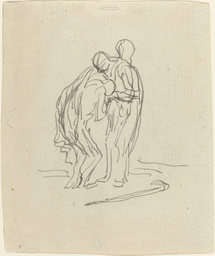Hear my prayer, Lord, listen to my cry for help; do not be deaf to my weeping. I dwell with you as a foreigner, a stranger, as all my ancestors were. Look away from me, that I may enjoy life again before I depart and am no more. Psalm 39:12–13

This song, probably from King David, expresses repentance. Stricken with illness, David feels silence from God and pleads that the Lord will bridge the distance that has become a wedge between them. The silence makes him feel like a foreigner and a stranger from God. Bereft, he seeks that their relationship be restored.
From the point of view of pilgrimage, this psalm echoes the theme of dislocation. The Hebrew words that David uses for “foreigner” and “stranger” broaden our understanding of this sense of not being at home (which I’m indebted to The NIV Application Commentary for illuminating). The Hebrew word for foreigner refers to someone who was not an Israelite but who inhabited the Promised Land, although without full rights. They may have been someone such as a servant or employee of an Israelite family. Another meaning of the word describes anyone not living in their native land – and thus this term could be applied to the Israelites themselves as they travelled to Canaan.
Thus to be a stranger and a foreigner meant living with tenuous rights. The landowner could become fickle and throw them out. Their ability to prosper is limited. And this is how the psalmist feels – he knows that his sin has rebuked his standing as a favored son. Now he is on the outside, looking in. He is as the prodigal son, tending the pigs and yearning for his father’s embrace.
Because we are sinful, our journeys entail times of separation from God due to our wrongdoing. But as with David and the prodigal son, when we repent, God in his mercy closes the gap. He runs toward us, embraces us, puts on the prized coat over our pig-slopped clothes and rejoices that we are home.
For reflection: “Let’s have a feast and celebrate. For this son of mine was dead and is alive again; he was lost and is found” (Luke 15:23–24).
Leave a Reply